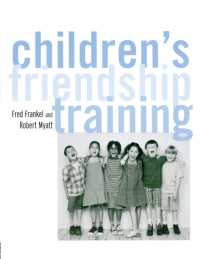Full Description
This book provides an in-depth exploration of women's resilience, leadership and empowerment through Indigenous knowledge and their crucial roles in various socio-cultural contexts across the world. It challenges the conventional narrative, highlighting the strength and resilience of Indigenous women in their communities that are historically marginalized. By interconnecting knowledge, tradition and justice, the volume addresses the contribution of Indigenous women in fostering the social change which has been often unnoticed. It provides a fresh insight on key topics such as Indigenous knowledge, Indigenous resilience, women roles (in traditional and patriarchal societies), women empowerment, community-based women's organization, social capital and community support. It also discusses the challenges of Indigenous women in patriarchal and market-driven societies. Recognizing the scarcity of literature, particularly on resilience of Indigenous women and leadership in promoting social change, this book sets out to expand the existing framework of leadership and social change. Through this nuanced analysis, this book recognizes the invisible contributions of Indigenous women in advancing their communities and broader societies.
Contents
Chapter 1. The Power of Resilience: Indigenous Women Reclaiming Knowledge, Leadership and Justice.- Part I: Indigenous Knowledge and Empowerment.- Chapter 2. Scrutinizing the indigenous and other protagonists in the handloom and handicrafts industry in India: How empowering is mainstreaming indigenous crafts for the women artisans and their communities?.- Chapter 3. Indigenous Knowledge as an Anchor from The Perspective of Arab-Palestinian Women in Israel: The Case of Economic Abuse.- Chapter 4. African Indigenous masculinities: An anti-colonial praxis.- Chapter 5. Take Flight: Working together, treasuring our collective indigeneity.- Chapter 6. Empowering Kolok Women Through Ikat Weaving Craftsmen in Bangkala Village, Bali: Expanding the Participation Space for Deaf Women.- Part II: Women's Roles in Traditional and Patriarchal Societies.- Chapter 7. A High-tech Job is a Dream": Pious Druze women with High-tech Careers Bridge between their Religious and Professional Identities.- Chapter 8. Navigating Health Capabilities: Ultra-Orthodox Women's Narratives of Medical Agency and Cultural Negotiation.- Chapter 9. Understanding Married Women's Experiences in Resolving Marital Disputes through VICOBA Participation in Kondoa and Dodoma City Councils, Tanzania.- Chapter 10. KAMER: A Prominent Example of Local Women's Organisation in Turkey.- Part III: Social Capital and Community Support.- Chapter 11. Social capital of the Rural Women' Circles (KGW) and their connections with social work in Poland.- Chapter 12. Navigating Organisational Contexts as Women Leaders.- Chapter 13. Moving in Complex Spaces: How Bedouin Women Organized During the October 7 War.- Chapter 14. A Western woman's journey among Indigenous African women.- Part IV: Addressing Discrimination and Violence.- Chapter 15. Aid Representatives' Perception of the Issue of Sexual Violence Among Palestinian Female Youth in Israel.- Chapter 16. We are all indigenous, aren't we?.- Chapter 17. Resources present and absent: Emotional reactions and coping resources among Bedouin -Arab teachers who began their careers during the COVID era.- Chapter 18. Amal: A woman ventures to trace new boundaries.- Chapter 19. Bridging Traditions and Futures: Indigenous Women as Architects of Change.








